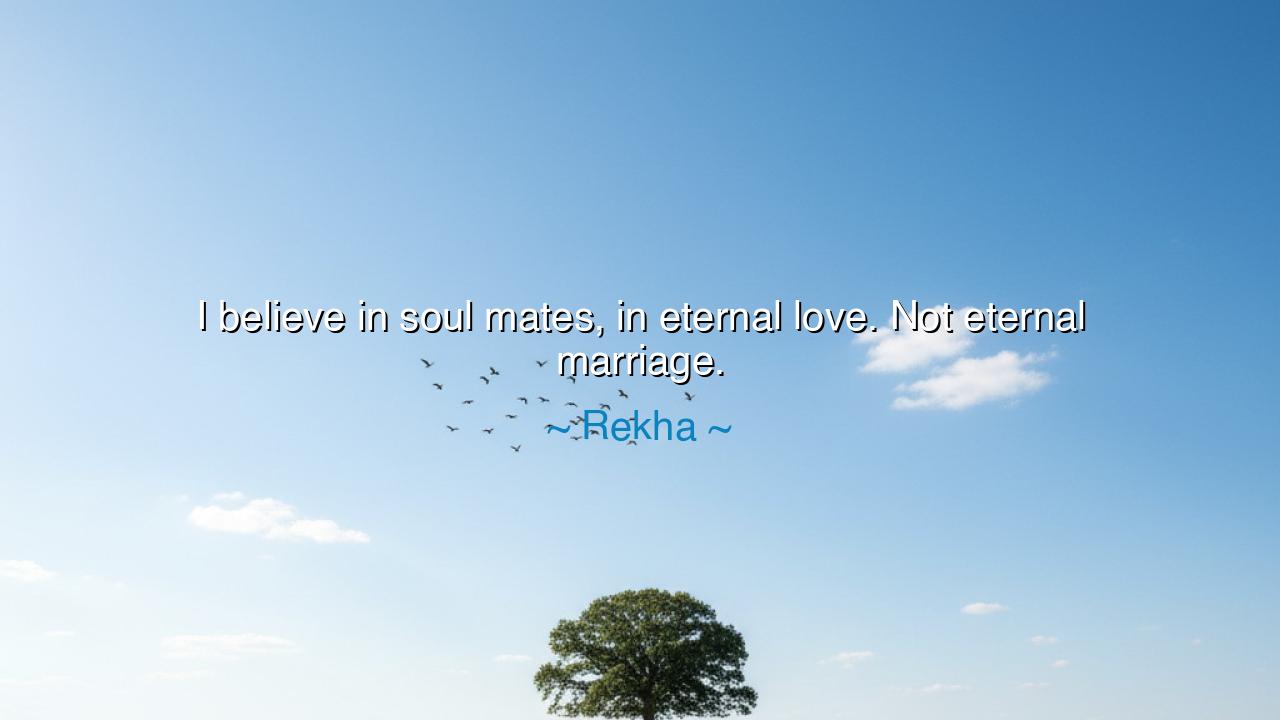
I believe in soul mates, in eternal love. Not eternal marriage.






In the journey of human existence, where love and union have long been at the heart of our most cherished stories, there comes a profound truth from Rekha, who speaks with the voice of one who understands the delicate nature of the human soul: "I believe in soul mates, in eternal love. Not eternal marriage." These words echo like a whisper from the deepest corners of the heart, reminding us that while love may transcend time, the institution of marriage—its formal bond—does not always carry the same eternal weight. The heart that loves with devotion and passion may remain steadfast, but the commitment made through the act of marriage is not always forever, for it is shaped by human hands, fallible and flawed.
To understand Rekha’s words, we must look to the eternal concept of the soul mate—the idea that there exists a person in this world with whom one shares a connection so deep, so undeniable, that no force can sever it. This connection transcends the physical, the temporary, and reaches into the very essence of being. The ancient Greeks, in their mythologies, spoke of soul mates through the tale of Aristophanes in Plato's Symposium, where the original humans were created with two heads, four arms, and four legs, and were divided by the gods into two halves. In this telling, the soul mate is the missing half, the one who completes the other in a union of wholeness. This speaks to the idea that love, in its deepest form, is not bound by the formality of marriage but by the recognition of a shared essence between two souls.
Marriage, however, is a creation of human society, a bond intended to shape the lives of individuals within a cultural framework. The ancient Romans, for instance, understood marriage as a civic duty, one that ensured the continuation of the state and the family. While love was certainly part of it, it was the legal and practical aspects that gave it strength and longevity. Yet, as Rekha so wisely points out, marriage itself—while important—does not necessarily embody the eternal nature of love. Love can endure without the institutional trappings of marriage, just as the sun continues to rise and set regardless of whether it is observed by all who live beneath it.
In the grand sweep of history, we see countless examples of eternal love that were not bound by the chains of marriage. Abelard and Heloise, whose love story has been immortalized in both tragic and romantic terms, were separated by the constraints of society, yet their letters to one another continue to reverberate through the centuries, bearing testimony to a love that was as real and eternal as any marriage. Their love was not shaped by the legalities of their time but by the connection they felt—a bond that transcended physical presence and continued even in the face of societal rejection. Their souls were united in a way that marriage could not encapsulate.
Similarly, in the ancient Indian epics, Radha and Krishna are often seen as the eternal lovers whose bond is spiritual, not necessarily defined by a formal marriage but by their divine connection. Their love, though marked by physical separation, is said to transcend time and space, illustrating that the soul’s connection is far deeper than any earthly commitment. Radha and Krishna remind us that love can endure, evolve, and remain eternal without being constrained by the temporal structures we place around it. Their story offers the timeless truth that true love cannot be limited by the bonds we create but is defined by the purity and depth of the connection between two souls.
The lesson from Rekha’s words is profound and clear: soul mates—the true connections between two beings—are not bound by the contracts and agreements that society imposes. Love, in its purest form, is eternal, transcending the formalities of marriage and remaining a bond that is unbroken by time. Marriage, while it can serve as a means to honor that bond, is not always the test of whether a love is eternal. In fact, love can exist far beyond the borders of any legal or social structure. What matters is the authentic connection, the recognition of the other as one’s true counterpart, and the commitment to nurture that connection regardless of the circumstances.
In our own lives, let us take these teachings and apply them with wisdom. Love is not defined by the contract signed, but by the sincerity and devotion with which we offer our hearts. Marriage can be a beautiful expression of that love, but it is not the only way to express commitment. We must honor the deeper, spiritual connection that binds us to others, recognizing that true love is not confined to a piece of paper but exists in the soul-to-soul bond we share. Let us not seek to bind love with unnecessary constraints, but instead, let us focus on cultivating a love that endures, whether or not it is bound by the formalities of marriage.
In the end, Rekha reminds us that love, in its most eternal and beautiful form, is not something we can fully control or define by society’s rules. It is something much grander, something that transcends boundaries and lives forever in the hearts of those who experience it. Let us seek that love, and nurture it, knowing that the connection between two souls is what truly endures.






AAdministratorAdministrator
Welcome, honored guests. Please leave a comment, we will respond soon